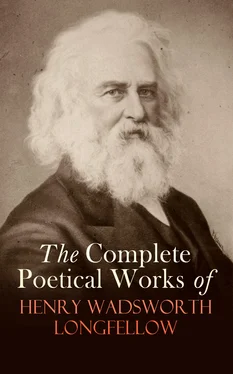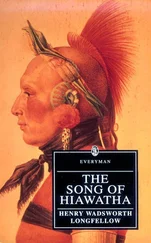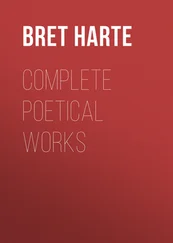Homeward then went Hiawatha
To the lodge of old Nokomis,
And the seven days of his fasting
Were accomplished and completed.
But the place was not forgotten
Where he wrestled with Mondamin;
Nor forgotten nor neglected
Was the grave where lay Mondamin,
Sleeping in the rain and sunshine,
Where his scattered plumes and garments
Faded in the rain and sunshine.
Day by day did Hiawatha
Go to wait and watch beside it;
Kept the dark mould soft above it,
Kept it clean from weeds and insects,
Drove away, with scoffs and shoutings,
Kahgahgee, the king of ravens.
Till at length a small green feather
From the earth shot slowly upward,
Then another and another,
And before the Summer ended
Stood the maize in all its beauty,
With its shining robes about it,
And its long, soft, yellow tresses;
And in rapture Hiawatha
Cried aloud, "It is Mondamin!
Yes, the friend of man, Mondamin!"
Then he called to old Nokomis
And Iagoo, the great boaster,
Showed them where the maize was growing,
Told them of his wondrous vision,
Of his wrestling and his triumph,
Of this new gift to the nations,
Which should be their food forever.
And still later, when the Autumn
Changed the long, green leaves to yellow,
And the soft and juicy kernels
Grew like wampum hard and yellow,
Then the ripened ears he gathered,
Stripped the withered husks from off them,
As he once had stripped the wrestler,
Gave the first Feast of Mondamin,
And made known unto the people
This new gift of the Great Spirit.
Table of Contents
Table of Contents
Two good friends had Hiawatha,
Singled out from all the others,
Bound to him in closest union,
And to whom he gave the right hand
Of his heart, in joy and sorrow;
Chibiabos, the musician,
And the very strong man, Kwasind.
Straight between them ran the pathway,
Never grew the grass upon it;
Singing birds, that utter falsehoods,
Story-tellers, mischief-makers,
Found no eager ear to listen,
Could not breed ill-will between them,
For they kept each other's counsel,
Spake with naked hearts together,
Pondering much and much contriving
How the tribes of men might prosper.
Most beloved by Hiawatha
Was the gentle Chibiabos,
He the best of all musicians,
He the sweetest of all singers.
Beautiful and childlike was he,
Brave as man is, soft as woman,
Pliant as a wand of willow,
Stately as a deer with antlers.
When he sang, the village listened;
All the warriors gathered round him,
All the women came to hear him;
Now he stirred their souls to passion,
Now he melted them to pity.
From the hollow reeds he fashioned
Flutes so musical and mellow,
That the brook, the Sebowisha,
Ceased to murmur in the woodland,
That the wood-birds ceased from singing,
And the squirrel, Adjidaumo,
Ceased his chatter in the oak-tree,
And the rabbit, the Wabasso,
Sat upright to look and listen.
Yes, the brook, the Sebowisha,
Pausing, said, "O Chibiabos,
Teach my waves to flow in music,
Softly as your words in singing!"
Yes, the bluebird, the Owaissa,
Envious, said, "O Chibiabos,
Teach me tones as wild and wayward,
Teach me songs as full of frenzy!"
Yes, the robin, the Opechee,
Joyous, said, "O Chibiabos,
Teach me tones as sweet and tender,
Teach me songs as full of gladness!"
And the whippoorwill, Wawonaissa,
Sobbing, said, "O Chibiabos,
Teach me tones as melancholy,
Teach me songs as full of sadness!"
All the many sounds of nature
Borrowed sweetness from his singing;
All the hearts of men were softened
By the pathos of his music;
For he sang of peace and freedom,
Sang of beauty, love, and longing;
Sang of death, and life undying
In the Islands of the Blessed,
In the kingdom of Ponemah,
In the land of the Hereafter.
Very dear to Hiawatha
Was the gentle Chibiabos,
He the best of all musicians,
He the sweetest of all singers;
For his gentleness he loved him,
And the magic of his singing.
Dear, too, unto Hiawatha
Was the very strong man, Kwasind,
He the strongest of all mortals,
He the mightiest among many;
For his very strength he loved him,
For his strength allied to goodness.
Idle in his youth was Kwasind,
Very listless, dull, and dreamy,
Never played with other children,
Never fished and never hunted,
Not like other children was he;
But they saw that much he fasted,
Much his Manito entreated,
Much besought his Guardian Spirit.
"Lazy Kwasind!" said his mother,
"In my work you never help me!
In the Summer you are roaming
Idly in the fields and forests;
In the Winter you are cowering
O'er the firebrands in the wigwam!
In the coldest days of Winter
I must break the ice for fishing;
With my nets you never help me!
At the door my nets are hanging,
Dripping, freezing with the water;
Go and wring them, Yenadizze!
Go and dry them in the sunshine!"
Slowly, from the ashes, Kwasind
Rose, but made no angry answer;
From the lodge went forth in silence,
Took the nets, that hung together,
Dripping, freezing at the doorway;
Like a wisp of straw he wrung them,
Like a wisp of straw he broke them,
Could not wring them without breaking,
Such the strength was in his fingers.
"Lazy Kwasind!" said his father,
"In the hunt you never help me;
Every bow you touch is broken,
Snapped asunder every arrow;
Yet come with me to the forest,
You shall bring the hunting homeward."
Down a narrow pass they wandered,
Where a brooklet led them onward,
Where the trail of deer and bison
Marked the soft mud on the margin,
Till they found all further passage
Shut against them, barred securely
By the trunks of trees uprooted,
Lying lengthwise, lying crosswise,
And forbidding further passage.
"We must go back," said the old man,
"O'er these logs we cannot clamber;
Not a woodchuck could get through them,
Not a squirrel clamber o'er them!"
And straightway his pipe he lighted,
And sat down to smoke and ponder.
But before his pipe was finished,
Lo! the path was cleared before him;
All the trunks had Kwasind lifted,
To the right hand, to the left hand,
Shot the pine-trees swift as arrows,
Hurled the cedars light as lances.
"Lazy Kwasind!" said the young men,
As they sported in the meadow:
"Why stand idly looking at us,
Leaning on the rock behind you?
Come and wrestle with the others,
Let us pitch the quoit together!"
Lazy Kwasind made no answer,
To their challenge made no answer,
Only rose, and slowly turning,
Seized the huge rock in his fingers,
Tore it from its deep foundation,
Poised it in the air a moment,
Pitched it sheer into the river,
Sheer into the swift Pauwating,
Where it still is seen in Summer.
Once as down that foaming river,
Down the rapids of Pauwating,
Kwasind sailed with his companions,
In the stream he saw a beaver,
Saw Ahmeek, the King of Beavers,
Struggling with the rushing currents,
Rising, sinking in the water.
Without speaking, without pausing,
Kwasind leaped into the river,
Читать дальше












